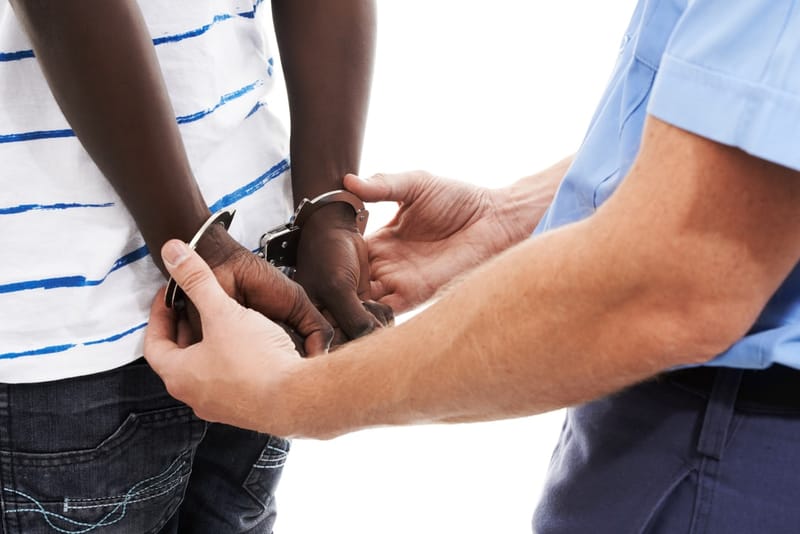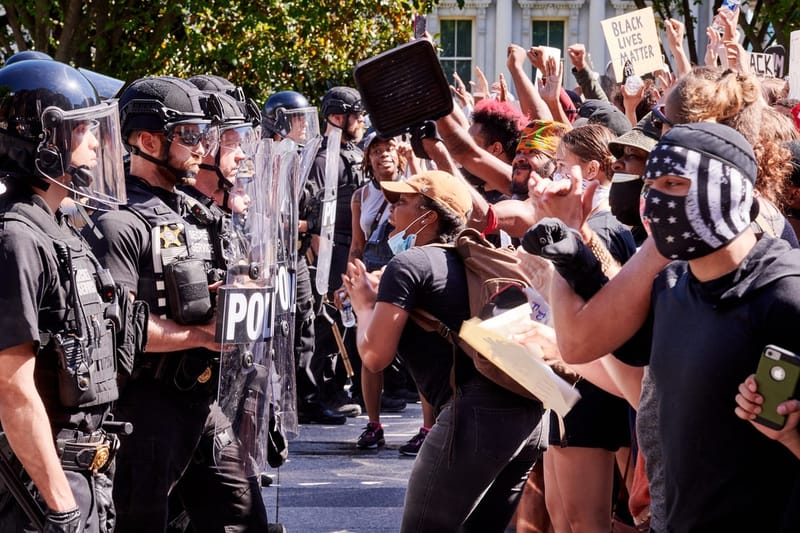
Fear is often a driver of extremism. Can reaching out to those most susceptible to right-wing extremism help them change direction?
Right-wing extremism is on the rise and presents a complex and concerning phenomenon. This week on Monash University’s podcast, “What Happens Next?”, terrorism and extremism expert Pete Lentini, an associate professor in Monash’s Faculty of Arts, talks to host Dr Susan Carland about the state of right-wing extremism in Australia and across the globe.
Pete identifies the fear of a loss of status, cultural heritage and privilege as primary drivers of this type of extremism. These fears manifest as a perceived threat of extinction for the white race and traditional values, fuelling sentiments of resentment and exclusion.

Despite the prevalence and threat posed by right-wing extremism, it’s not always taken as seriously as it should be. This lack of seriousness may stem from societal attitudes or a failure to acknowledge the underlying grievances that contribute to extremist ideologies.
There are also unique challenges in countering this form of radicalisation. Unlike Islamist extremism, which has seen efforts to disengage individuals through community involvement and support, right-wing extremism lacks similar programs and former extremists willing to engage in counter-narratives.
Pete points out that certain right-wing radical ideas have seeped into mainstream political discourse, contributing to a shift in the political landscape. This normalisation may further legitimise extremist viewpoints, creating a breeding ground for radicalisation.
Read more: What's turning young men into killing machines?
So is censorship a solution? Pete argues that, in fact, it could exacerbate the issue by driving discourse underground and granting extremists a sense of martyrdom. Instead, he advocates for informed debate, media literacy and challenging extremist narratives as more effective strategies.
Today’s episode underscores the importance of addressing underlying grievances, fostering community engagement and educating the public to engage in informed debate to prevent the normalisation and proliferation of extremist ideologies. It will require a nuanced approach that balances the need for security with the preservation of democratic values and civil liberties.
Transcript
[MUSIC]
[CHANTING]
Kim Borg: “If we don’t change our behaviour, by the year 2050, we’re going to have more plastic in the oceans than fish.”
[SPLASHING]
Andrew Markus: So do we want a system of anarchy? And that’s what we probably have at the moment.
Bodean Hedwards: And they estimate that there’s about 40.3 million people in some form of modern slavery. There is no single industry not touched by this issue.
Nick Faulkner: Definitely, racists have been very good at using the internet.
Patrick Emerton: There's been a shift in thinking about who counts as a terrorist, and there are currently terrorist laws being used against white nationalists.
Andrew Markus: People's lives are being destroyed, that, to me is enough to say something needs to be done here.
[MUSIC]
Susan Carland: Hi there. I'm Susan Carland, and welcome to What Happens Next?, where we take a closer look at some of the sticky issues facing the world.
[MUSIC]
Susan Carland: Today we'll talk to an expert in terrorism and extremism who's going to help us understand the drivers behind these ideologies and what can be done to change it.
Pete Lentini is an associate professor of politics and international relations at Monash University, and he heads up the Global Terrorism Research unit. He's a highly sought-after media commentator and the convener of Monash’s Master of Counterterrorism Studies.
[MUSIC]
Pete Lentini: Hi I’m Pete Lentini, I’m the founding director of the Global Terrorism Research Centre, and a founding member of the Contempt Research Initiative at Monash, which stands for Research Initiative for the Study of Contemporary Threats in Emerging Movements in Politics and Theology.
Susan Carland: Pete Lentini, welcome to the show.
Pete Lentini: Thanks, Susan.
Susan Carland: Alright, Pete, when we think about right-wing extremism, I want you to paint a picture for me. If we continue on with the way that we're handling right-wing extremism, what could the world look like if we don't change anything?
Pete Lentini: Well, I guess some of the ways that we might want to think about is actually how are we handling it? And are we handling it properly? And maybe, what can we do better?
And I think if we look in the sense of, are we taking it very seriously? I think on a couple of levels we might have to say, certainly not as seriously as we should.
One of the main drivers of right-wing extremism largely has to deal with this fear of a loss of status generally, and also I think what's really big is this fear of some type of extinction, okay? So whether that be the extinction of the white race and also, I think, maybe some elements of cultural heritage, and also what would be considered to be some forms of privilege.
So I think when, if we don't really stop and try to take those things very, very seriously, I think that we run the risk of trivialising some of their politics as abhorrent as they may be, okay?
So one of the things I think that really is potentially problematic is the sense that when we hear about right-wing extremism automatically, there is finger-pointing. There's demonising of those particular people. And I think, again, I don't wanna downplay the sense that racism is abhorrent and we should not be tolerant of various forms of exclusionary politics in the same boat.
But I think what's significant is that – and I think what the government does right, say, with respect to Islamist politics – is that when word comes out that there's usually a young male in these types of circumstances, has started to take on radical viewpoints, moving towards extremist viewpoints there's a system that gets put in place for support for these types of people. And again, that's the right thing to do.
Unfortunately, we don't have the same types of systems in place yet for, again, predominantly young men who might be going through these types of experiences. There's no support that they feel as if their worldview is not comprehended, it's denigrated, et cetera.
And I think one of the things that we have to really, really do is acknowledge that for them that loss of… whether it be social status, the view that the white race is becoming extinct, they’re losing the Australia that they believe in.
To them, that's as serious as the way that, for instance, Muslims in Birmingham felt about the publication of The Satanic Verses, and how that they felt that that was really undercutting all of that stuff that they held sacred. So I think that one of the things that's really significant is that we're not trying to identify what's sacred to those people.
So that's one of the things where you can lose stuff. But by the same token, in not being vigilant against some of the racism that comes forward – and here I'm talking about, in many ways, the politicians at the national level, when they don't really stand up against this stuff – then you create a circumstance whereby there's this atmosphere that almost makes it feel like it's permissive to hold these types of abhorrent viewpoints.
And that, to a certain extent, may give some people who have these types of abhorrent viewpoints, but might just be misguided people who, with some conversation, you might be able to swing around. It creates a circumstance where it makes it look like those types of viewpoints are valid and can be encouraged.
Susan Carland: Right, so it's actually a really delicate dance where you acknowledge the grievances that these young men – like you said, mostly young men – might have without endorsing them. I imagine that's a pretty delicate dance. And whether that's with right-wing extremism – right-wing extremists – or, like you said, Islamist extremists, finding that balance, how do you do that?
Pete Lentini: Well, this is one of the things that I think within the context of Islamist extremism, there have been some bona fide efforts on a number… by a number of different stakeholders to take this stuff very, very seriously. We're starting to see that. Regrettably, it took something like the Christchurch attack for people to start taking seriously the threat of right-wing extremists.
And this is despite the fact that all of the studies of liberal democratic countries tend to reinforce that since 9/11, although Islamists have certainly generated the most lethal terrorist attacks with the highest body counts, we see that the most frequent amounts of terrorist attacks have actually been by those on the extreme right.
There really hasn't been the development of programs in this country – despite the fact that they're certainly moving in that way, and there have been a couple of programs, and it’s started to disengage people from the extreme right – that you have had with the… within the Islamist context.
One of the things have been… Some of the successes of the Islamist programs have been that you've had, especially if you look at Indonesia, Singapore, et cetera, those people who previously were involved in extremism and, in some cases, terrorist attacks – they've renounced, and they’ve kind of worked with a lot of the civil society organisations, state groups to help work into programs on getting other people to disengage. And these people have the street credibility because they're they don't necessarily pick on people for having viewpoints where they want to see various types of political changes. However, they argue very, very strongly against taking violent approaches.
Now, if we switch this within the extreme right circumstances in Australia, then we see that we have a complete void of former right-wing extremists that are available to engage in this type of activity. It's been acknowledged that some of the people who have been high-profile individuals within this right-wing extremist space have not really been willing to engage in this stuff.
And I guess the other thing that's really significant is that the sites of radicalisation for Islamist extremism and also right-wing extremism are very, very different. There's certainly some merit in trying to get some types of civics programs, things like that, working for the high school system. But by the same token, that might have worked within the context of Islamism, and you also have whole communities that can basically put people back on the straight and narrow.
You have a very, very different situation with right-wing extremism because what we've been seeing is that many of those people who are moving into right-wing extremism are somewhat older. So what types of institutions can you work with there? They come from a variety of different types of ethnic groups and also religious or non-religious backgrounds. So in those respects, it's very, very difficult to try and establish some type of dialogue where you can actually get that balance.
[MUSIC]
Susan Carland: Like you said, they don't have a community around them in the same way that maybe Islamist extremists do. So can that be replicated elsewhere? Or are there other tips or things, success stories, that research is suggesting, “Actually, this should be one thing we should be doing with right-wing extremists”?
Pete Lentini: For those people pursuing such a track, there are more opportunities for them to actually become involved in what might be considered to be mainstream actions for political change – joining political parties, forming political parties, things to that effect.
You see a lot of those people who have radical tendencies… They might actually become involved in some of the more neo-populist or radical right political parties that have been cropping up over the last 20 years or so. And again, we've also had a long history of different types of established right-wing, radical and extremist parties in this country. Going back certainly well into the previous century.
Susan Carland: The radical shift into that mainstream political arena brings with it its own challenges there, doesn't it? When we have politicians, like some of the ones we might have in Australia now, saying some pretty confronting or unpleasant things about racial or religious minorities in the country, or when we see nonviolent, totally politically legitimate but not-great-to-see protests happening in Australia, with big billboards or signs people carrying about who they do and don't want in this country – those are all legal. They're all absolutely operating within the recognised political system we have in Australia.
But does that have a bleed-on on effect into the right-wing extremists? Does the existence of these right-wing radical ideas in a legitimate arena then give legitimacy to the extremists as well?
Pete Lentini: I guess one of the ways that you contest that is the results.
And I think one of the things that really stands out is the sense that – especially since about 2013, when the Rise Up Australia Party stood, we see that – despite the fact that they might have contested a wide range of seats across the country and things like that, in most circumstances, they actually didn't get more votes than the invalid votes. I think they were only up, maybe – like in the 2013 and 2016 elections, for instance – I think there were only a couple of instances where they actually got more votes than the invalid votes in the actual electorates.
And there's been some research which suggests that… Well, in many cases, what you have is that right-wing radical – and in some cases, extremist – parties, they don't really thrive beyond the neighbourhood level. So it looked at some of the voting data at individual voting booths and stuff like that. And still, even at that level, the votes against certainly worked against them.
So to a certain extent, this kind of… It's really a double-edged sword when we're talking about the impact on legitimacy. Because if you have a situation where they're running and they have to deal with the whole broad type of range of ideas that they have to compete against if they get very, very few votes, then to a certain extent it reinforces to some that, “Okay, this might not be the way to go. We're blocking the wrong type or backing the wrong types of horses.”
And so that doesn't go forward because the people who are actually going to vote for these types of candidates largely… Because there's been a number of studies that have come out, and certainly there was an article, I think, in the Guardian a few months back, which talked about one of the reasons why the radical right in Australia is not so popular is because basically, the Coalition picks up all of its ideas. So, to a certain extent, regrettably, that has now become mainstream policy in some circumstances.
Susan Carland: It's almost becoming normalised.
Pete Lentini: Yeah. And similarly…. And I guess if we look, say, for instance, at it in the American context, the agenda that some of the Republicans have picked up is basically the agenda that David Duke has been advocating since the late 1980s. This stuff is now mainstream.
So in some cases, you get situations where those types of parties, they tank out because of the legitimacy. And the other type of thing that you might have to worry about… And in some cases, people get disillusioned, then disengaged from those types of beliefs after that, thinking it's basically a wasted vote.
In some cases, it reinforces the correctness of some of these people's viewpoints and how they’re really the national… some type of a vanguard, and they're the only types of people who know the truth. And I think if we look at one of the bedrocks right now of, in many cases, radical right and extreme right policies, conspiracy theory and persecution, especially persecution of white people, is really front and centre.
And I never thought that in teaching political science in the 21st century that I'd actually have to start including components and modules on the importance of conspiracy theory in mainstream US, and Russian, and some other types of countries’, politics. And also that it exists in many Australian contexts as well.
[MUSIC]
Susan Carland: When the far right keep stretching further right it brings the rest of the centre with it, which shifts further right. We can't deny now that they say these things.
And the Scanlon Foundation has shown for many years, consistently, that anti-Muslim sentiment in Australia is sitting consistently at 40 per cent. So these ideas are being absorbed. What is that? What does that do to a nation?
Pete Lentini: Well, again, I think this is one of the reasons why I think we're seeing, across the board – certainly if not in-office, then certainly influential – neo-populist-type politicians.
You've got situations where they weave those types of abhorrent types of policies and rhetoric into a broader narrative which also touches upon certain elements of economic decline for certain people. This kind of politics of the nostalgia of the lost Australia, “Make America Great Again”. This kind of striving for this Britain that is very, very different to continental Europe. Things that work along those lines there.
And I think you also have other circumstances where it works into the changing of the political discourse because you now have a situation where the Left had traditionally been the guardians of civil liberties, okay? Now you've got them trying to twist around debates about aspects of freedom of speech, okay?
I've actually never heard anybody who critiqued political correctness who actually contributed anything substantial to modern-day political discourse. It's basically just these people who are pissed off because they can't use abusive language anymore, okay? It's not to generate some type of constructive argument about things. They want to be able to persecute in this speech.
And so, when you've got this combination of people feeling threatened within the context of international security systems, they feel that they're relying on what would be considered to be stigmatised knowledge within the context of the levels of the threat that different types of social groups might be posing towards them.
And then this combination of feeling of we're losing our rights, we're losing our heritage and stuff like that, this kind of creates that type of environment where you do have that substantial shift to the right, which makes these types of narratives really fall within what might be might have been considered to be radical or extreme, say, maybe 15, 20 years ago in a certain context. That's now considered to be things that the heartland wants to see defended and protected.
Susan Carland: So what do we do? Is censorship the solution? Do we ban these online forums where right-wing extremists congregate? What do you think we should do?
Pete Lentini: Look, I actually think that could be pretty problematic. Because one of the things that really has kept most people from becoming extremists is when you actually read what some of these extremists have to say. And that's one of the things that… In the marketplace of ideas, most of these people's arguments cannot hold up, and that's why most of the people move away from them.
The other thing to bear in mind is that, given proper media literacy and also if there's more encouragement for specialists and key stakeholders to make more vital contributions to the public sphere, not just in specialist journals and reports and stuff like that… If these types of people could be engaged much more broadly, then there's a possibility that these types of ideologies can be discussed in a much more sensible, more detailed way.
Because if people are getting their ideas about these things through social media, responding to it on social media, regrettably – especially if they go on Twitter, you don't have much space in which to do this, okay? But by the same token, if you have circumstances where both sides can actually have a little bit more time to express ideas, then I think these types of things can… that the ideas can actually be debated and spoken about much, much more, much, much more clearly.
I also think that one of the things that is important in a democracy is that citizens need to be well-informed. And if all this stuff starts to get banned, citizens are not going to be informed about what these groups are about. And if that's the situation, two things happen.
One: Okay, you drive the discourse underground and in places in the dark web, and you create a situation where these types of people are not dealing with anybody outside of their own types of peer groups. And that's really where we start to see problems, when you move from radicalism to extremism, extremism into terrorism, because there's nobody there to challenge your viewpoints effectively, okay? So keeping things out in the open still provides those mechanisms for education, but most importantly for challenge, okay?
The other thing that that does is that by banning, you automatically start giving these groups some type of a martyr status, okay? And when people can start operating from a position of victimhood, that gives them a sense of legitimacy. And that gives them an extra sense of coherence to their narrative. And that also makes it look like they're the ones who are defending democracy – that the state or special interest groups are beating up on them unjustly: “We're the only ones who can stand up”, things to that effect. So that type of censorship is problematic in driving that as well.
Now that said, it doesn't mean that everything should come through, because there were certain things that certainly should not be able to come through. Anything that talks about aspects of operations, how to construct weapons, certainly, stuff that would be considered to be things that would incite… Those types of things naturally have to be addressed within current censorship laws and things for that effect.
But by the same token, when we don't inform citizens about what these groups are about, then they lose their rights to find out about them. And that again, I think, is regressive within the context of a liberal democracy where you need educated people.
Susan Carland: Pete, that was very interesting. Some absolutely fascinating food for thought. Thank you so much.
Incredible insights from Pete on how these movements grow and gain momentum and what's really driving the extremists in our midst.
Special thanks to Pete Lentini for coming on the show. In our next episode, we’ll find out what individuals could do or say when they see or experience extremist attitudes or ideologies in their everyday lives. Do we call out that behaviour, or do we starve it of oxygen? The strategies from our behaviour change expert might surprise you.
I'll see you on the next episode of What Happens Next?.
Don’t miss an episode – subscribe to What Happens Next? now on your favourite podcast app.
Already a subscriber? You can help other listeners find the show by giving What Happens Next? a rating and review.





